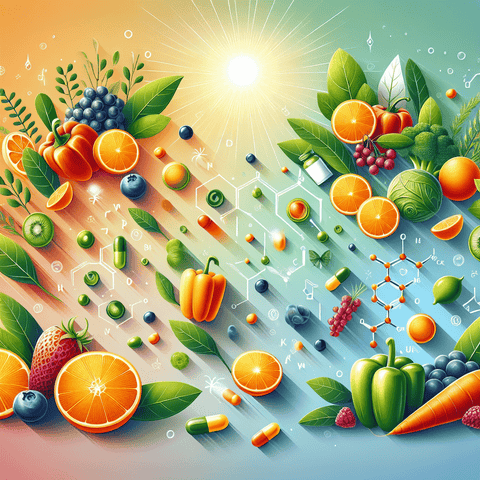Introduction
Vitamins are vital organic compounds that the human body requires in small amounts to function correctly. Although our bodies perform countless complex processes every day, they cannot produce most vitamins on their own. Therefore, obtaining these nutrients through a balanced diet or supplements is essential. With modern lifestyles, varying dietary patterns, and certain health conditions, vitamin supplementation becomes crucial to maintaining health and preventing deficiencies. In this comprehensive guide, we explore the 13 essential vitamins, their roles in bodily functions, and how to ensure adequate intake through diet and high-quality supplements.
Whether you’re managing your health proactively or addressing specific health concerns, understanding vitamins' roles and benefits can significantly enhance your approach to nutrition. This blog will offer an in-depth look at the different types of vitamins, how to classify them, their sources, deficiency symptoms, and recommended supplementation strategies. Let’s dive into these essential building blocks of human health.
Vitamins Relevant to Nutritional Supplements: An Overview
Vitamins play indispensable roles in our metabolic pathways, immune system, bone integrity, and overall well-being. Although many vitamins can be sourced through whole foods, modern dietary habits, processing methods, and environmental factors have made vitamin supplementation increasingly important. As a result, nutritional supplements now serve as a practical tool for filling dietary gaps and ensuring consistent intake of these life-sustaining micronutrients.
Supplements help mitigate risks associated with vitamin deficiencies, especially for individuals with limited dietary diversity, specific health conditions, vegan or vegetarian lifestyles, or increased nutritional requirements. For example, Vitamin D production depends heavily on sun exposure; for people in northern latitudes or those who spend minimal time outdoors, supplementation is often necessary. Similarly, people with absorption issues may need higher doses of water-soluble vitamins such as Vitamin B12 or folate.
One critical aspect of vitamin supplementation is dosage accuracy. Multivitamins and individual supplements are formulated based on Recommended Daily Allowances (RDA) and Tolerable Upper Intake Levels (UL). These guidelines help consumers avoid both deficiency and toxicity, ensuring safe and effective use. Furthermore, supplements often come in various forms—tablets, capsules, powders, and liquids—tailored to specific absorption rates and consumer preferences.
For individuals seeking targeted benefits—for instance, immune support from Vitamin C or bone strength from Vitamin D—selecting high-quality supplements ensures efficacy and safety. Always look for third-party testing, transparent labeling, and nutrient forms with high bioavailability (such as methylated B vitamins or D3 versus D2).
Ultimately, while food remains the best source of nutrients, supplements serve a vital role in maintaining adequate vitamin intake—especially in a fast-paced world where consistent, balanced eating can be challenging.
Vitamin Classification: Fat-Soluble vs. Water-Soluble Vitamins
Vitamins are traditionally categorized by their solubility—either fat-soluble or water-soluble. This classification influences their absorption, storage, excretion, and ultimately their role in supplement formulation. Understanding the fundamental differences is essential for optimizing their therapeutic use and avoiding potential imbalances.
Fat-soluble vitamins include Vitamins A, D, E, and K. These vitamins dissolve in fat and are stored in the body’s fatty tissues and liver. Because of this storage capability, they don’t require daily replenishment, but overconsumption can lead to toxicity. These vitamins are typically absorbed better when consumed with dietary fats and often paired with oils or emulsifiers in supplements to enhance bioavailability.
On the other hand, water-soluble vitamins include the B-complex group (B1, B2, B3, B5, B6, B7, B9, B12) and Vitamin C. These vitamins dissolve in water and are not stored in significant quantities in the body. Instead, excess amounts are excreted in urine, which means that a continuous daily intake is critical. Due to their water solubility, these vitamins are more sensitive to heat and light and may be lost during cooking or food processing. Supplements often provide these in higher doses to account for variability in absorption and to meet metabolic demands.
The solubility of vitamins also guides storage and packaging strategies. Fat-soluble vitamins are typically encased in softgel capsules to preserve their stability and prevent oxidation. Water-soluble vitamins, meanwhile, are often in powder or tablet form and combined with stabilizing agents.
Here is a snapshot of both classifications:
- Fat-Soluble: A, D, E, K – Support vision, bone health, antioxidant defenses, and blood clotting.
- Water-Soluble: B-complex (B1–B12), C – Involved in energy metabolism, nervous function, immunity, and skin repair.
For tailored support, targeted supplement collection like the Vitamin K collection on Topvitamine.com ensures you’re nourishing your body appropriately based on solubility and function.
Essential Nutrients: The Vitamins Our Bodies Cannot Produce
The human body is incredibly capable but lacks the capacity to synthesize most vitamins, rendering them "essential" — we must source them exogenously. There are 13 such essential vitamins that are crucial for processes ranging from energy production to collagen synthesis and neurological functioning.
These vitamins include:
- Fat-Soluble: A, D, E, K
- Water-Soluble: B-complex (B1, B2, B3, B5, B6, B7, B9, B12), Vitamin C
Each of these plays specialized roles, and failing to obtain adequate amounts can lead to serious health consequences. Populations at higher risk of deficiency include older adults, pregnant and lactating women, individuals with gastrointestinal disorders, alcohol dependency, and those following restricted diets, such as vegans.
Vitamin B12, for example, is found primarily in animal products. Thus, vegans are particularly susceptible to B12 deficiency without careful planning or supplementation. Similarly, Vitamin D synthesis relies on UVB radiation, making it insufficient during winter months in many regions, especially in Europe.
Since food availability and eating patterns vary drastically across cultures and socioeconomic backgrounds, supplementation often serves as a practical and science-based solution to meet these essential nutrient needs. Products fortified with essential vitamins or standalone nutritional supplements help bridge this gap for widespread populations.
Maintaining optimal levels of essential vitamins not only prevents deficiency-related diseases but also supports general well-being and disease prevention. Tools like regularly monitoring your nutrient intake, periodic blood tests, and consulting with healthcare professionals can help in assessing your vitamin status and adjusting supplementation accordingly.
Vitamin Functions: How These Nutrients Support Body Processes
Each of the 13 essential vitamins serves unique and overlapping functions in the body. They act primarily as coenzymes or precursors to vital molecules involved in metabolic processes. Here is a detailed look at what each vitamin does:
- Vitamin A: Essential for vision, skin health, immune function, and embryonic development.
- Vitamin D: Regulates calcium absorption, supports bone integrity, and modulates immune response. Accessible in the Vitamin D product line.
- Vitamin E: Functions as an antioxidant, protecting cells from oxidative stress and supporting immune health.
- Vitamin K: Vital for blood clotting and bone metabolism. Available in the Vitamin K supplements.
- Vitamin C: Promotes collagen synthesis, bolsters immune defenses, and augments iron absorption. Explore its benefits here.
- Vitamin B1 (Thiamine): Aids in glucose metabolism and nerve function.
- Vitamin B2 (Riboflavin): Supports energy production and acts as an antioxidant.
- Vitamin B3 (Niacin): Helps in the synthesis of enzymes, energy production, and DNA repair.
- Vitamin B5 (Pantothenic Acid): Essential for the formation of Coenzyme-A in metabolic pathways.
- Vitamin B6 (Pyridoxine): Influences immune function, amino acid metabolism, and neurotransmitter synthesis.
- Vitamin B7 (Biotin): Critical for fatty acid metabolism and gene regulation.
- Vitamin B9 (Folate): Crucial for DNA synthesis and cell growth, especially during pregnancy.
- Vitamin B12 (Cobalamin): Required for red blood cell production, neurological function, and DNA synthesis.
Supporting these functions with a combination of balanced nutrition and smart supplementation is integral for maintaining optimal health, endurance, and longevity.
Vitamin Deficiencies: Recognizing Symptoms and Risks
Vitamin deficiencies disrupt essential physiological functions, often manifesting through subtle and frustrating symptoms. Recognizing early signs can halt progression and enable effective dietary or supplement interventions.
Some common symptoms include:
- Vitamin A: Night blindness, dry skin
- Vitamin D: Muscle weakness, bone pain, frequent infections
- Vitamin C: Bleeding gums, anemia, poor wound healing
- Vitamin K: Easy bruising, excessive bleeding
- Vitamin B12: Fatigue, memory issues, neurological disturbances
- Folate (B9): Birth defects, fatigue, irritability
Populations at risk include:
- Older adults with decreased absorption efficiency
- Vegans missing animal-based vitamins like B12
- Pregnant women needing higher folate and iron
- Alcohol consumers facing poor nutrient use and storage
- People with chronic diseases such as celiac or Crohn’s
In long-term consequences, deficiencies can contribute to conditions like osteoporosis, anemia, scurvy, or even neurological decline. Preventative supplementation through carefully curated products like DHA & EPA Omega-3 can support overall wellness and compensate for dietary limitations.
Dietary Sources: Nourishing Your Body with Vitamins
A nutrient-diverse diet is the foundation of vitamin sufficiency. Whole foods provide a synergy of vitamins, minerals, antioxidants, and phytochemicals vital for holistic health. Here’s a summary of food sources for each essential vitamin:
- Vitamin A: Liver, carrots, sweet potatoes, kale, eggs
- Vitamin D: Fatty fish, eggs, fortified dairy
- Vitamin E: Nuts, seeds, spinach, sunflower oil
- Vitamin K: Leafy greens, broccoli, fermented foods
- Vitamin C: Citrus fruits, bell peppers, strawberries, broccoli
- Vitamin B-complex: Whole grains, dairy, meat, legumes, leafy vegetables
However, not everyone can consume an ideal diet consistently. That’s where supplementation comes in. Topvitamine.com offers a broad range of categories like Vitamin C and Magnesium supplements to bridge potential dietary gaps.
When selecting a supplement:
- Choose formulas with high bioavailability (e.g., methylcobalamin for B12)
- Look for Certifications: GMP, third-party testing
- Prefer balanced formulations with synergistic ingredients
Conclusion
Understanding the 13 essential vitamins is fundamental for managing your health effectively. Whether it’s immunity, skin health, cognitive clarity, or skeletal strength, these nutrients play irreplaceable roles in maintaining the smooth operation of your biological systems. A balanced diet rich in nutrient-dense foods should be the first line of defense against deficiency. However, high-quality supplementation can offer crucial support where diet falls short.
Be mindful of your lifestyle, unique nutritional needs, and consult healthcare providers to personalize your approach. For accessible, science-backed products, explore offerings through Topvitamine’s diverse supplement collections.
Q&A Section
Q: What are the 13 essential vitamins?
A: The 13 essential vitamins are A, C, D, E, K, and the eight B vitamins: B1 (Thiamine), B2 (Riboflavin), B3 (Niacin), B5 (Pantothenic Acid), B6 (Pyridoxine), B7 (Biotin), B9 (Folate), and B12 (Cobalamin).
Q: What is the difference between fat-soluble and water-soluble vitamins?
A: Fat-soluble vitamins (A, D, E, K) are stored in the body’s fat tissues and do not require daily intake. Water-soluble vitamins (B-complex, C) are not stored and need daily replenishment.
Q: How can I prevent vitamin deficiencies?
A: Consuming a varied, balanced diet, staying informed about your specific needs, and using validated supplements can prevent deficiencies. Monitoring your levels with routine checkups helps too.
Q: Are supplements necessary if I eat a healthy diet?
A: While a healthy diet is foundational, supplements can be beneficial in cases of limited nutrient intake, absorption issues, or increased requirements (e.g., pregnancy, aging).
Q: Where can I buy high-quality vitamin supplements?
A: Explore premium nutritional formulas at Topvitamine.com, featuring validated, science-backed vitamins like D, C, K, and more.
Important Keywords
Essential vitamins, fat-soluble vitamins, water-soluble vitamins, vitamin D supplements, vitamin C for immunity, vitamin K benefits, magnesium for energy, omega-3 DHA EPA, vitamin deficiency symptoms, multivitamin supplements, vitamin-rich foods, signs of vitamin deficiency, dietary supplements, Topvitamine products.



